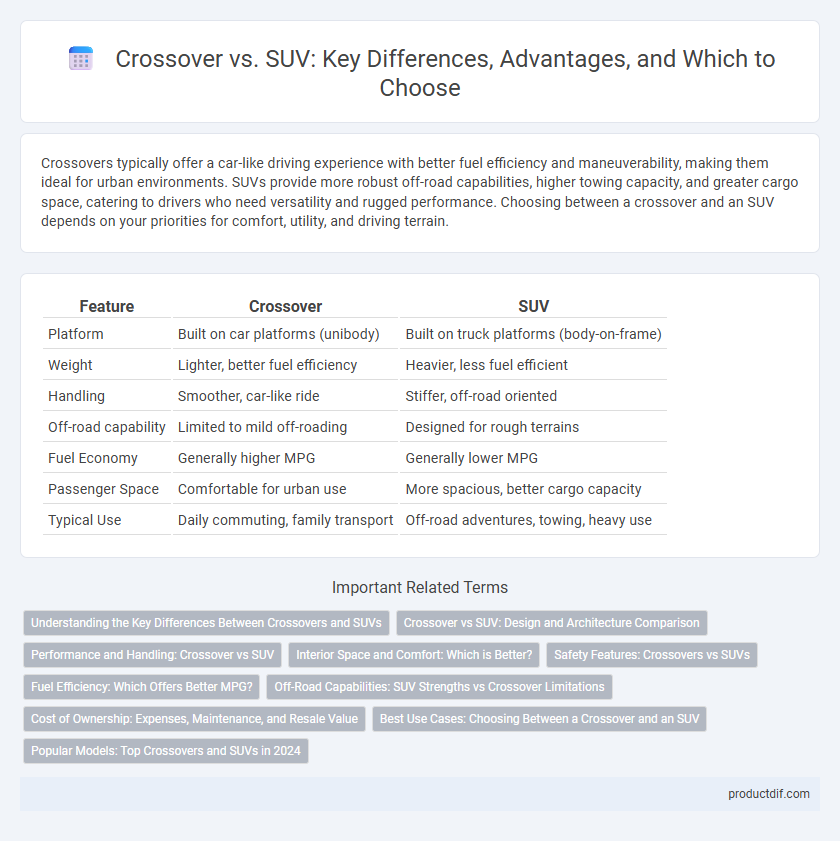Crossovers typically offer a car-like driving experience with better fuel efficiency and maneuverability, making them ideal for urban environments. SUVs provide more robust off-road capabilities, higher towing capacity, and greater cargo space, catering to drivers who need versatility and rugged performance. Choosing between a crossover and an SUV depends on your priorities for comfort, utility, and driving terrain.
Table of Comparison
| Feature | Crossover | SUV |
|---|---|---|
| Platform | Built on car platforms (unibody) | Built on truck platforms (body-on-frame) |
| Weight | Lighter, better fuel efficiency | Heavier, less fuel efficient |
| Handling | Smoother, car-like ride | Stiffer, off-road oriented |
| Off-road capability | Limited to mild off-roading | Designed for rough terrains |
| Fuel Economy | Generally higher MPG | Generally lower MPG |
| Passenger Space | Comfortable for urban use | More spacious, better cargo capacity |
| Typical Use | Daily commuting, family transport | Off-road adventures, towing, heavy use |
Understanding the Key Differences Between Crossovers and SUVs
Crossovers are built on a car-based platform, offering a lightweight design and better fuel efficiency, while SUVs use a truck-based platform designed for heavier towing and off-road capability. Crossovers typically feature unibody construction, providing a smoother ride and improved handling compared to the body-on-frame structure of traditional SUVs. Understanding these structural and functional distinctions helps buyers choose between versatile urban driving and rugged performance needs.
Crossover vs SUV: Design and Architecture Comparison
Crossovers are built on a unibody architecture similar to cars, resulting in lighter weight and improved fuel efficiency, while SUVs typically use a body-on-frame design that enhances durability and towing capacity. The design of crossovers emphasizes a car-like driving experience with smoother handling, whereas SUVs prioritize ruggedness and off-road capability with higher ground clearance. These architectural differences influence interior space, ride comfort, and overall vehicle performance in distinct ways.
Performance and Handling: Crossover vs SUV
Crossovers typically offer lighter frames and car-like unibody construction, providing better fuel efficiency and more responsive handling compared to traditional SUVs. SUVs, built on truck-based platforms, deliver superior off-road capabilities and towing power but often sacrifice agility and ride comfort. The choice between crossover and SUV performance depends on preferences for urban driving ease versus rugged terrain strength.
Interior Space and Comfort: Which is Better?
Crossover vehicles typically offer a more car-like interior with spacious cabins and comfortable seating, ideal for daily commuting and family use. SUVs generally provide greater interior space, especially in terms of headroom and cargo capacity, catering to those needing more versatility and rugged comfort. Choosing between a crossover and an SUV often depends on whether you prioritize refined interior comfort or maximum spaciousness for passengers and gear.
Safety Features: Crossovers vs SUVs
Crossovers often prioritize advanced safety features like electronic stability control, multiple airbags, and collision avoidance systems due to their car-based platforms, enhancing maneuverability and crash protection. SUVs, built on truck-based frames, typically offer superior off-road safety features, including reinforced body structures and advanced four-wheel-drive systems for stability on rugged terrains. Both vehicle types increasingly incorporate driver-assist technologies such as lane-keeping assist, adaptive cruise control, and automatic emergency braking to maximize occupant safety.
Fuel Efficiency: Which Offers Better MPG?
Crossovers typically offer better fuel efficiency than SUVs due to their lighter weight and car-like unibody construction, which reduces overall fuel consumption. SUVs often have larger engines and heavier frames designed for off-road capability, leading to lower miles per gallon (MPG). For city and highway driving focused on maximizing MPG, crossovers are generally the more fuel-efficient choice.
Off-Road Capabilities: SUV Strengths vs Crossover Limitations
SUVs offer superior off-road capabilities with features like higher ground clearance, advanced four-wheel-drive systems, and reinforced suspension designed for rugged terrain. Crossovers, built on car platforms, typically lack the robust chassis and off-road technology, limiting their performance in extreme conditions. This makes SUVs the preferred choice for serious off-roading enthusiasts seeking durability and enhanced traction.
Cost of Ownership: Expenses, Maintenance, and Resale Value
Crossover vehicles generally offer lower cost of ownership compared to traditional SUVs due to better fuel efficiency and reduced maintenance expenses. Insurance premiums and routine service costs tend to be more affordable for crossovers, while SUVs often incur higher fuel consumption and more expensive repair parts. Resale value for SUVs can be higher in markets favoring off-road capability, but crossovers maintain steady depreciation rates thanks to growing demand for urban-friendly, versatile vehicles.
Best Use Cases: Choosing Between a Crossover and an SUV
Crossovers excel in urban environments and daily commuting with superior fuel efficiency and easier maneuverability, making them ideal for small families and city dwellers. SUVs are better suited for off-road adventures, towing capabilities, and heavy cargo transport, appealing to outdoor enthusiasts and larger families needing extra space. Choosing between the two depends on prioritizing fuel economy and handling versus rugged performance and capacity.
Popular Models: Top Crossovers and SUVs in 2024
The 2024 lineup features popular crossovers like the Toyota RAV4, Honda CR-V, and Mazda CX-5, known for their fuel efficiency and urban versatility. Leading SUVs such as the Ford Explorer, Jeep Grand Cherokee, and Chevrolet Tahoe offer enhanced off-road capabilities and spacious interiors. Buyers seeking a balance between everyday practicality and rugged performance often compare these top models to determine the best fit for their lifestyle.
Crossover vs SUV Infographic

 productdif.com
productdif.com